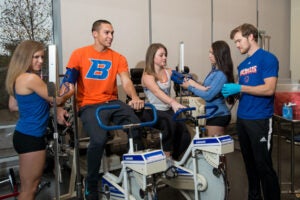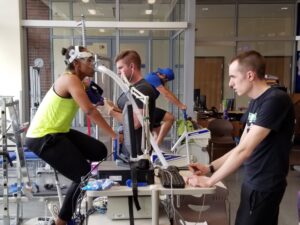Classes Taught in the Lab
KINES 330 Exercise Physiology Laboratory
The physiological and biochemical changes accompanying exercise and training with emphasis on application of scientific principles to training program design. This is the laboratory course to accompany exercise physiology which is an introduction to the physiological considerations applied to human movement in physical activity, sport, and exercise. It is assumed that students entering KINES 330/1 have a basic understanding of biology, chemistry, human anatomy, and physiology. This course is meant to provide a basic background in the techniques of measuring human physiological performance for kinesiology students preparing to be athletic trainers, coaches, exercise scientists, health educators, personal trainers, physical educators, physiologists, and for those considering medical school, positions in the biomedical and biotechnology fields, and/or planning to attend graduate school. The focus will be on the fundamental skills and techniques used in exercise physiology study and research, and the use of these tools and techniques in participating in, analyzing, and improving various physical activities.
Students will be able perform basic assessments of human physiological performance and be able to understand the purpose, benefits, limitations, and value of each as it applies to assessment, research, and exercise prescription. In addition, students will develop an understanding of exercise physiology that will enable them, as a practitioner, to understand and evaluate information and enhance their ability to help others improve movement outcomes, safety, and efficiency.
KINES 436 Exercise Testing and Prescription

Kines 436, Exercise Testing and Prescription, is designed to teach students how to administer a Health Risk Appraisal prior to exercise testing and/or training, assess the various components of health-related fitness (e.g., cardiorespiratory endurance, body composition, muscular strength and endurance, and flexibility and range of motion), and prescribe exercise for the purpose of improving health and fitness. As part of that class, students participate in a weekly lab experience where they learn the skills of performing the Health Risk Appraisal and fitness assessments listed above. For example, students learn how to perform the YMCA submaximal cycle ergometer test to assess a beginning exerciser’s stamina, to perform different tests to determine body composition such as with skinfold calipers and the BodPod, and to administer a maximal graded exercise stress test with ECG interpretation to assess an individual’s functional capacity in the context of potential cardiovascular abnormalities.
Upon completion of this course, students are prepared to sit for the American College of Sports Medicine (ACSM) Certified Exercise Physiologist (EP-C) certification exam. Also, these students are primed for entry-level positions in the health and fitness industry working with clients who want to improve their health and/or fitness, lose weight, and make other positive lifestyle modifications related to improving their quality of life into middle-age and older-adulthood.
KINES 515 Exercise Physiology Laboratory

Practical application of the principles that govern response and adaptation of the human body to exercise, utilizing laboratory equipment to collect data and analyze results. This is the laboratory course to accompany physiology of activity (KINES 510) which is a graduate course considering the physiology of human movement in physical activity, sport, and exercise. It is assumed that students entering KINES 515 have a basic understanding of biology, chemistry, human anatomy, physiology, and exercise physiology. This course is meant to provide a more detailed background in the inquiry into, and the techniques of, measuring human physiological performance for kinesiology students preparing to be athletic trainers, coaches, exercise scientists, health educators, personal trainers, physical educators, physiologists, and for those considering medical school, positions in the biomedical and biotechnology fields, and/or planning to continue graduate studies. The focus will be on the skills and techniques used in exercise physiology study and research, and the use of these tools and techniques in participating in, analyzing, and improving various physical activities.
Students will be able select and perform assessments of human physiological performance and be able to understand the purpose, benefits, limitations, and value of each as it applies to assessment, research, and exercise prescription. In addition, students will develop an understanding of exercise physiology that will enable them, as a practitioner, to understand and evaluate information and enhance their ability to help others improve movement outcomes, safety, and efficiency.